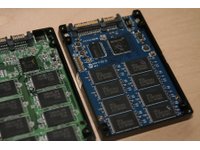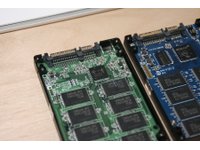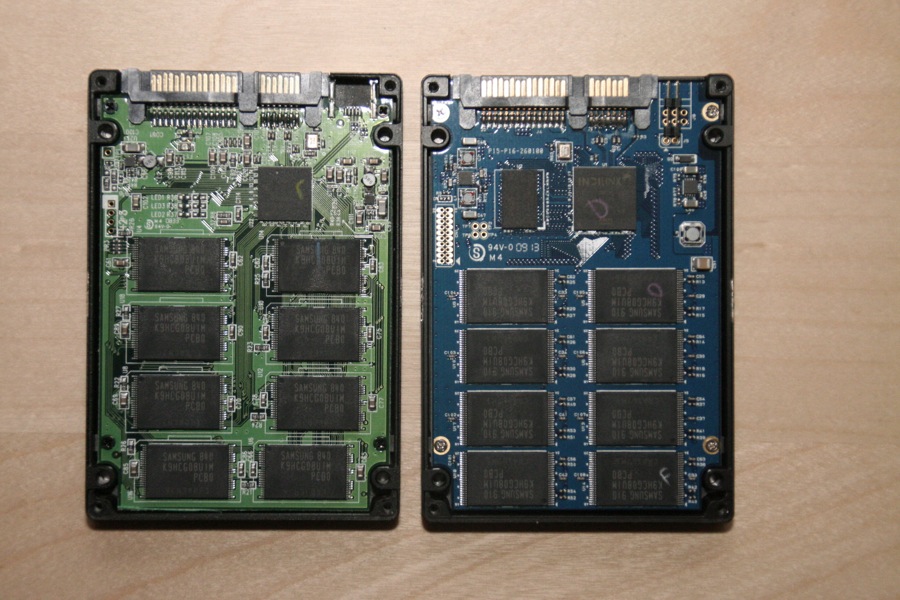Patriot Memory's Torqx SSD Vs. Intel's X25-M
When was the last time you upgraded your PC? Was it a CPU? Was it a graphics card?
As the saying goes, a chain is only as strong as its weakest link. This saying also remains true for a computer system. There's no refuting that the slowest part of a computer system is its storage system.
Up until the last year or so, everything ran on hard drives except very rare server systems that focused on performance. These specialized systems also came with stratospheric prices--well beyond the range of consumers. Solid state drives (SSDs) changed all that recently with more down-to-earth prices and exceptional performance.
Upgrading a HDD-based system to a SSD will provide instant gratification. Before you can even play a game, or use an application, the first thing that must occur is data fetching. Most of the time, the CPU wastes cycles waiting around for the hard drive to deliver the necessary data. With an SSD upgrade, you experience an immediate and noticeable impact on everything your computer does.
Despite the huge performance gains, two major things plague SSDs:
- Poor quality flash memory controller, performance
- Cost
Patriot Memory's new Torqx SSD addresses both--more so the former.
Get Tom's Hardware's best news and in-depth reviews, straight to your inbox.
The new Torqx SSD utilizes a flash controller from a company called Indilinx. There are several reviews online that have looked into Indilinx's new controller and so far the results appear positive. This is a crucial distinction because up until recently, most SSDs on the market utilized the horrible JMicron JMF602 controller. This particular JMicron controller was low costing, hence manufacturers were quick to utilize it. Unfortunately, the tradeoff between cost and performance was a bad one. Not only did JMicron-based SSDs heavily degraded in performance over time, users experienced system stuttering--the controller simply could not keep up with data requests from the CPU. Because of this, some manufacturers shipped SSDs with two JMF602's in internal-RAID mode to alleviate the stuttering.
Heralded as the world's best desktop SSD, the Intel X25-M up until now remains largely unbeaten. However, Intel's current lineup of SSDs are quite costly. As you'll see, a current-generation Indilinx-based SSD can come close in performance, and in some cases even beat Intel's offerings.
Patriot's new Torqx 128 GB SSD utilizes the new Indilinx 1DX110M00 controller and comes with 64 MB of onboard cache. The drive also comes in 64 GB and 256 GB flavors, all utilizing Indilinx's fantastic controller. We can't but feel partly responsible for this drive. We constantly beggared Patriot to move to Indilinx controllers.


Green SSD: JMicron-based Patriot WARP SSD; Blue SSD: Indilinx-based Patriot Torqx
The true test of the drive comes after several weeks of usage. Because of the way SSD drives work, they will slowly degrade in performance over time--JMicron-based drives take a huge hit. SSDs must erase a used block before it can be rewritten to again. This factor combined with wear leveling technologies are primary culprits for poor random write performance.
We decided to run the Torqx 128 GB through a week's worth of typical usage on a MacBook Pro with a 2.2 GHz Core 2 Duo notebook, 4 GB of memory. The notebook was used because notebooks are prime candidates for SSD upgrades--SSDs negate worries about vibration. The operating system in use was Mac OS X Leopard 10.5.7.
Our preliminary results:
Xbench 1.3, Random - Patriot Memory Torqx 128 GB
- Uncached Write: 146.85 MB/sec. [256K blocks]
- Uncached Read: 211.38 MB/sec. [256K blocks]
Clearly the Torqx does extremely well. All SSDs perform slower with 4K blocks, and our results are in line with other drives in the same class. Compared to the Intel X25-M 80 GB:
Xbench 1.3, Random - Intel X25-M 80 GB
- Uncached Write: 73.37 MB/sec. [256K blocks]
- Uncached Read: 219.60 MB/sec. [256K blocks]
Under random access performance, which is the most critical for SSDs, the Torqx performs exceptionally well in our preliminary tests. In fact, the Torqx gives the Intel X25-M 80 GB a run for its money under random write performance.
We have to make note here that on a Windows PC, users will see even higher numbers, for both drives. This is because OS X turns on Journaling in its file system by default. While Journaling will provide increased data security in case of a fault, performance will take a hit. According to Apple, users may see up to 10-percent better performance with Journaling disabled.
At $399, the Torqx is still at the high-end of the price spectrum. However, the Torqx provides similar or--in some cases--better performance than the more expensive Intel X25-M series per gigabyte, making it an attractive option. The 64 GB model can be had for roughly $218 while the 80 GB X25-M costs nearly $100 more.
Look for an in-depth review of the Torqx--with more detailed tests--in a future SSD roundup from Tom's Hardware.
[Correction: The Torqx has 64 MB of cache, not 32 MB]
-
deputc26 Not conclusive, let's see 4k random writes. The article should read "Like all other Indilinx based SSDs the Torqx almost beats Intel"Reply
I say almost because although Indilinx is faster at some things intel takes the cake overall and uses less power. -
TheMan1214 At the very least even if the Indilinx doesn't beat the intel, it comes pretty close which lets me rest a little easier knowing that the competition is still there. i'm excited to see some more detailed testsReply
-
NuclearShadow I really look forward to when the prices start becoming low enough to become mainstream. By then they should be able to hold much larger amounts of data too.Reply -
Doesn't anybody in Tomshardware read Anand's articles on Anandtech.com? It was the Anand who had the great influence on fixing Indilinx controller firmware while test OCZ SSD drives. It was him who found out the importance of random write of 4K blocks for the OS. What the hell is with these 256K blocks? Who cares about 256K blocks? If the upcoming SSD review from Tomshardware is like this, I am going to be upset about the quality of articles here...Reply
-
cah027 I am cah027 from the future and I have a message about storage tech...Reply
There will be a completely different technology invented before SSD are perfected enough to become mainstream!
You will see! -
one-shot Anand has had some great SSD articles recently. I wish we could see that same quality here again. After reading the reviews about the Indilinx controller, I'm concerned with the slow down that some of the drives have experienced.Reply -
sublifer deputc26Not conclusive, let's see 4k random writesDid you read the last sentence?Reply
Look for an in-depth review of the Torqx--with more detailed tests--in a future SSD roundup from Tom's Hardware
-
gwolfman SatanDoesn't anybody in Tomshardware read Anand's articles on Anandtech.com? It was the Anand who had the great influence on fixing Indilinx controller firmware while test OCZ SSD drives. It was him who found out the importance of random write of 4K blocks for the OS. What the hell is with these 256K blocks? Who cares about 256K blocks? If the upcoming SSD review from Tomshardware is like this, I am going to be upset about the quality of articles here...+1 for you. I agreeReply -
gwolfman SatanDoesn't anybody in Tomshardware read Anand's articles on Anandtech.com? It was the Anand who had the great influence on fixing Indilinx controller firmware while test OCZ SSD drives. It was him who found out the importance of random write of 4K blocks for the OS. What the hell is with these 256K blocks? Who cares about 256K blocks? If the upcoming SSD review from Tomshardware is like this, I am going to be upset about the quality of articles here...Sorry for the second post. I'd also like to add that it is/was Anand who changed the way SSDs are performing. Thanks to him we have drives like the Vertex and the Torqx. I dunno how much influence it had on Intel's drives though (not sure how involved he was with Intel).Reply -
hakesterman Good Review, Thanks for the Info. Keep us up to date with SSD, were all lookingReply
foward to the day when all PC's are SSD.
